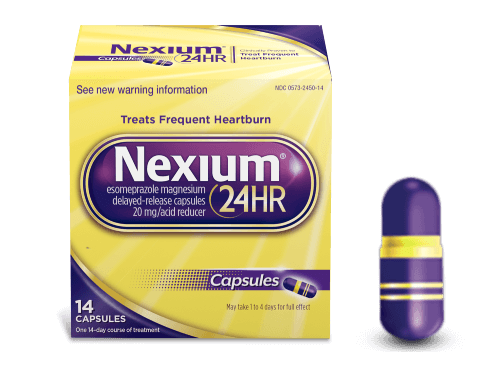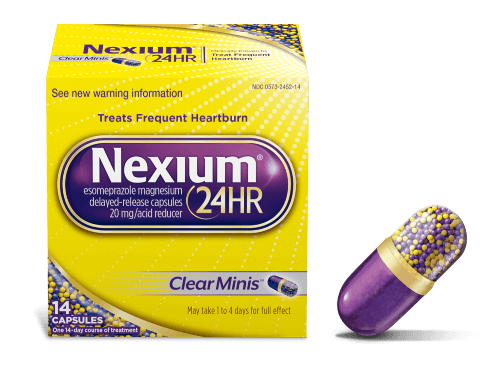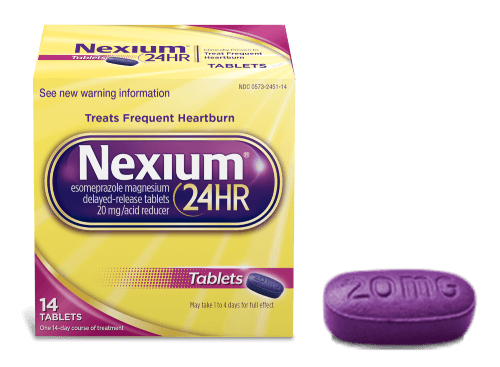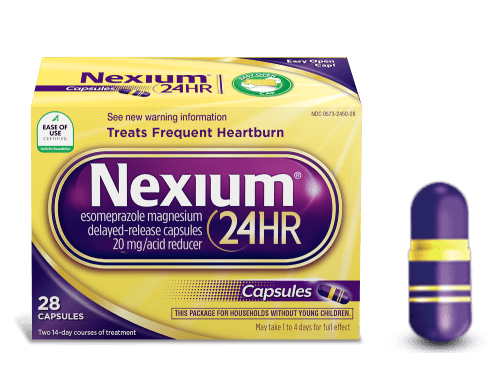Gastroesophageal reflux disease, or GERD, is a condition in which the acid-containing contents in your stomach leak back up into your esophagus, the tube that connects your throat to your stomach.1 Although GERD is not usually serious, this condition can cause discomfort that disrupts your everyday life.2 Luckily, there are treatment and prevention options if you experience GERD.
Treatment under professional care
Before seeking treatment for GERD, you should see your healthcare provider for a diagnosis from your healthcare provider. Your treatment should be under their supervision.
Typically, GERD can be treated with a combination of lifestyle changes and prescription medication.1 Over-the-counter medications like Nexium 24HR do not treat GERD. Nexium 24HR provides powerful, long-lasting relief for frequent heartburn, or heartburn that occurs more than two days a week.
If you experience acid reflux frequently, you may have developed GERD,5 which should be treated only under the care of your healthcare provider.2
Once they diagnose you with GERD, your healthcare provider will be able to recommend specific treatment options. In addition to suggesting prescription medication, your healthcare provider might advise you to make lifestyle changes such as losing weight or avoiding triggering foods like chocolate, alcohol, and acidic food.2
If medication and lifestyle changes don’t improve your GERD, your healthcare provider might recommend surgery or other procedures3 These procedures are typically not recommended until other options have been exhausted.
What causes GERD?
GERD happens as a result of acid reflux. Acid reflux occurs when the valve at the end of your esophagus doesn’t properly close when after food enters your stomach.4 Acid then flows from your stomach through the esophagus and into your throat and mouth, giving you a sour taste.
Although it’s normal to experience acid reflux occasionally, frequently experiencing acid reflux can lead to painful, disruptive symptoms. Although frequent heartburn and GERD both occur as a result of acid reflux, GERD is a more severe form.
Diagnosis
We’ll say it again: if you believe you have developed GERD, you should seek a diagnosis from your healthcare provider. Diagnosis and treatment of GERD should happen under their supervision.
When you visit a healthcare provider, they may be able to diagnose GERD based on a physical examination and a history of your symptoms.3 To confirm the diagnosis, they might recommend an upper endoscopy. In this procedure, your healthcare provider inserts a thin tube with a tiny light and camera down your throat to examine the inside of your esophagus and stomach.3 Another option for diagnosis is an ambulatory acid (pH) probe test. A monitor is placed in your esophagus that tests when and for how long your stomach acid refluxes.3
GERD Symptoms
Before you seek a diagnosis and treatment plan, it’s good to be aware of the symptoms of GERD. While they can vary among people, these symptoms are the most common.5
- Heartburn.
- Regurgitation, that is food that comes back into your mouth from the esophagus.
- The feeling of food caught in your throat.
- Coughing.
- Chest pain.
- Difficulty swallowing.
- Vomiting.
- Sore throat and hoarseness.
Home Remedies
In addition to the treatment plan recommended by your healthcare provider, certain lifestyle changes may also reduce the frequency of acid reflux and help treat GERD at home. These habits may reduce the severity or frequency of GERD symptoms.3
- Maintain a healthy weight. Your weight may be putting pressure on your abdomen, which can push up your stomach and cause acid reflux.
- Ditch the cigarettes. Smoking can affect the proper function of your lower esophageal sphincter, which keeps acid out of your esophagus.
- Elevate your bed. If you experience GERD at night, raising the head of the bed by six to nine inches may alleviate symptoms.
- Don’t eat late at night. Wait a few hours after eating before lying down or going to bed.
- Chew thoroughly. Eating too fast can cause acid reflux.
- Avoid triggering food and beverages. Acidic food, spicy food, alcohol, chocolate, mint, garlic, and caffeine can trigger acid reflux.
- Avoid tight clothes. Tight clothing can squeeze your stomach and push acid up into the esophagus.
Although GERD can be uncomfortable and painful, many treatment options can provide relief. Once you’ve been diagnosed with GERD by your healthcare provider, following their treatment recommendations often brings relief. So, if you’re unsure whether your symptoms are a result of GERD or frequent heartburn, don’t hesitate to make an appointment and get help.
To learn more about acid reflux and frequent heartburn, explore more articles from Nexium 24HR.





